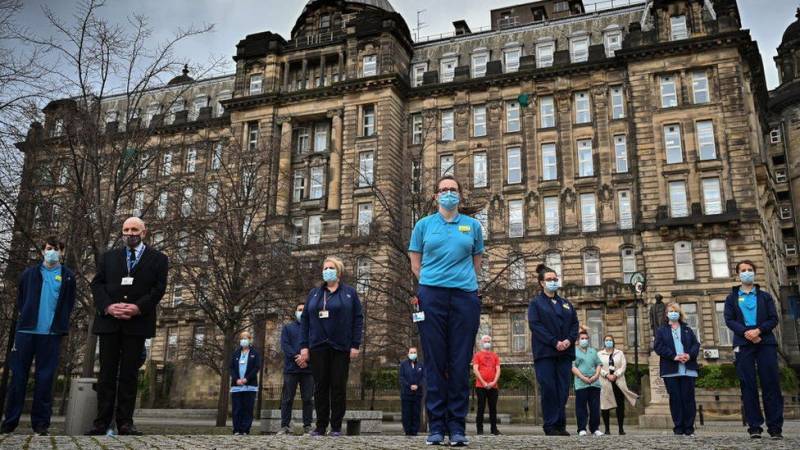UK marks two years since first virus lockdown

Stay tuned with 24 News HD Android App

Britain on Wednesday held a minute's silence to remember the victims of the coronavirus pandemic, on the second anniversary of the country's first lockdown.
The tribute came as the country experiences another surge of infections, just weeks after scrapping all remaining restrictions, and record numbers in hospital in Scotland.
The "National Day of Reflection" saw members of the public fall silent at 1200 GMT and calls for lights to be shone or flowers to be displayed in a window of their home at 2000 GMT.
A bereaved families group tied yellow ribbons to Westminster Bridge in central London and the capital's ambulance service held a service in its memorial garden.
Landmarks across the UK will be lit up in yellow, the colour of end-of-life care charity Marie Curie, which has organised the event.
Britain has been hit by some of the highest pandemic death tolls in Europe.
Nearly 164,000 people have died within 28 days of a positive Covid-19 test, while more than 186,000 have the virus listed on their death certificate, according to government statistics.
"Those lost to Covid will never be out of our hearts and minds, and today we reflect as a nation," Prime Minister Boris Johnson said in a statement.
"The national day of reflection is a chance to come together, mourn and offer our collective support and sympathies to all those grieving."
Johnson, who in 2020 was treated in intensive care for Covid, said the event was also "a chance to thank everyone who cared for us throughout", paying tribute to the "heroic efforts" of frontline health and care staff, grief counsellors and charity workers.
Better position
Johnson ordered Britain's first national lockdown on March 23, 2020, shutting schools and non-essential shops and services, and banning gatherings of more than two people.
He warned then that "many lives sadly will be lost", though the current toll stands well above the worst predictions of British scientists or politicians made early in the pandemic, factoring in government interventions.
Following a successful vaccination programme which has seen more than two-thirds of those aged over 12 given three doses, Johnson lifted all curbs earlier this year.
Cases have surged since, in part due to a subvariant of the Omicron strain, leading to another spike in hospital admissions.
But this has not resulted in a marked increase in those needing critical care. A fourth vaccine jab is being rolled out from next week to the most vulnerable, including the over-75s and the immuno-suppressed.
Scotland, which sets its own health policy, has experienced the most dramatic rise in infections.
But its health minister Humza Yousaf said cases could now start to stabilise after "the most challenging week" for its hospitals.
"Every single health board (is) having to de-prioritise other treatments, and at times quite urgent treatment, and people are having to suffer as a result," he warned.
But he added: "We are in a much better position when dealing with high case numbers than we were two years ago".
